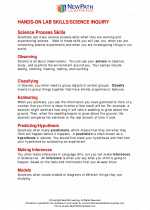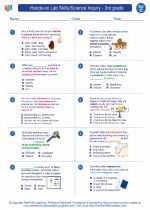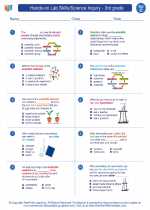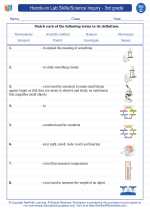Medical Technology
Medical technology refers to the tools, equipment, and procedures used in the field of medicine to diagnose, treat, and prevent diseases and medical conditions. It encompasses a wide range of technologies, from simple devices like thermometers and stethoscopes to advanced imaging machines and robotic surgical systems.
Study Guide for Medical Technology
- Introduction to Medical Technology: Understand the definition and scope of medical technology, and its importance in modern healthcare.
- Diagnostic Technologies: Learn about different diagnostic tools such as X-rays, MRI, CT scans, and laboratory tests, and how they are used to identify diseases and conditions.
- Treatment Technologies: Explore the various medical devices and technologies used in treatment, including surgical instruments, drug delivery systems, and radiation therapy machines.
- Emerging Technologies: Stay updated on the latest advancements in medical technology, such as nanotechnology, telemedicine, and wearable health monitoring devices.
- Ethical and Social Considerations: Discuss the ethical implications and societal impact of medical technology, including issues related to patient privacy, access to healthcare, and the use of genetic testing.
Studying medical technology can provide a fascinating insight into the intersection of science, technology, and healthcare, and the ways in which innovative tools and techniques are revolutionizing the field of medicine.
.◂Science Worksheets and Study Guides Third Grade. Hands-on Lab Skills/Science Inquiry - 3rd grade
Study Guide Hands-on Lab Skills/Science Inquiry - 3rd grade
Hands-on Lab Skills/Science Inquiry - 3rd grade  Worksheet/Answer key
Worksheet/Answer key Hands-on Lab Skills/Science Inquiry - 3rd grade
Hands-on Lab Skills/Science Inquiry - 3rd grade  Worksheet/Answer key
Worksheet/Answer key Hands-on Lab Skills/Science Inquiry - 3rd grade
Hands-on Lab Skills/Science Inquiry - 3rd grade  Worksheet/Answer key
Worksheet/Answer key Hands-on Lab Skills/Science Inquiry - 3rd grade
Hands-on Lab Skills/Science Inquiry - 3rd grade  Worksheet/Answer key
Worksheet/Answer key O-W-L
O-W-L  Vocabulary/Answer key
Vocabulary/Answer key Hands-on Lab Skills/Science Inquiry - 3rd grade
Hands-on Lab Skills/Science Inquiry - 3rd grade  Vocabulary/Answer key
Vocabulary/Answer key Hands-on Lab Skills/Science Inquiry - 3rd grade
Hands-on Lab Skills/Science Inquiry - 3rd grade 

 Worksheet/Answer key
Worksheet/Answer key
 Worksheet/Answer key
Worksheet/Answer key
 Worksheet/Answer key
Worksheet/Answer key
 Worksheet/Answer key
Worksheet/Answer key
 Vocabulary/Answer key
Vocabulary/Answer key
 Vocabulary/Answer key
Vocabulary/Answer key

The resources above cover the following skills:
Science as Inquiry and Process: A student should understand and be able to apply the processes and applications of scientific inquiry. A student who meets the content standard should:
Develop an understanding of the processes of science used to investigate problems, design and conduct repeatable scientific investigations, and defend scientific arguments.